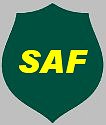The Michigan
Forester On-Line A
Publication of the Michigan Society of American Foresters
Selected Articles From
Issues Prior to Fall, 1997
Michigan's
Conservation Districts Successfully Provide Forestry Assistance Rick Lucas Report of the
Communication/Policy Team Ned
Caveney Future of Michigan
Forestry-Vision and Action-1996 and Into The Future Peter Grieves
Michigan's
Conservation Districts Successfully Provide Forestry Assistance , Rick A. Lucas, District Forester, Osceola-Lake
Conservation District
Conservation Districts in Michigan have been
providing forestry services to private nonindustrial landowners
since 1978. Districts began offering forestry information and
technical assistance to landowners in response to an identified
need and increasing public demand at a time when similar services
provided by the state were being reduced.
Nonindustrial private forest landowners
control nine million acres, about half of Michigan's forested
area. For many years, however, the only forest management
assistance available to these landowners on a public service
basis was through the Cooperative Forest Management (CFM) program
partially funded by the USDA Forest Service and administered by
the Michigan Department of Natural Resources (MDNR).
By the late 1970s, public demand for
forestry assistance was increasing substantially. Ironically,
state budget problems then led to cuts in an already limited
MDNF-CFM Program. Eventually, some areas of the state were left
without the services of a MDNR forester.
In an attempt to meet the increasing public
need and demand for forestry services in the face of state
cutbacks, some conservation districts began hiring foresters. But
the instability of local funding made it difficult for districts
to hire and retain experienced foresters.
The Michigan Department of Agriculture's
(MDA) Forestry Assistance Program began as an effort to ease the
financial burden of the districts in providing forestry services
to landowners. MDA's initial efforts involved small grants
awarded to districts on a dollar-for-dollar match to supplement
local forestry funds.
The current administrative arrangement
consists of 23 grants to each of 23 joint district forestry
programs. This includes an addition of 10 new grants established
in fiscal year 1995-96. A joint district forestry program
involves two or more districts sharing grant funds for the
employment of one full-time forester to serve the needs of
landowners in those conservation districts. Some of the districts
sharing an MDA Forestry Assistance Program grant were able to
obtain local funds to match the MDA grant and allow each district
to hire its own forester. Currently, MDA supplies districts with
individual grants of $30,000.
At present, the Forestry Assistance Program
involves 55 of Michigan's 82 conservation districts. Through the
program, districts employ 26 foresters in 25 full-time positions
and one half-time position. For fiscal 1995, the total program
cost to the state for the 23 grants was $690,000.
The Forestry Assistance Program has been a
popular and highly successful program. In 1994, when there were
still only 13 grants, the program provided over 10,000 landowner
contacts involving over 225,000 acres of private forests. Through
referrals to private consulting foresters, the program made
available to market about $3,000,000 worth of wood products!
Report to
the Policy/Communication Team , Ned
Caveney
The annual Michigan SAF Policy Workshop was
held on July 12, 1996, at Hidden Valley Resort in Gaylord.
The objective of the workshop was to move
ahead with the revision and updating of the Michigan SAF
publication entitled, "Voluntary Forest Management
Guidelines for Michigan". This document was published in
1987 in cooperation with the Michigan Chapter of the Wildlife
Society.
The publication is divided into sections with
various people taking on the responsibility of updating a certain
section. The responsible individuals presented their updates at
the workshop and received valuable input on how to further
improve the document.
Following is a list of people responsible for
various sections. If any member has suggestions or wishes to
provide input, please contact that person working on the section
of concern.
Forward Ned Caveney
It is the intent of the Policy/Communication
Team that we have draft copies of this publication available at
the fall meeting for final review with the publication coming in
early 1997.
Future of
Michigan Forestry - Vision and Action - 1996 and Into the Next
Century , Peter Grieves, Executive
Director of the Michigan Association of Timbermen
What does the future hold for forest
communities? We know that we can increase harvest levels as
standing inventories continue to increase in the 18.6 million
acres of timberlands of Michigan. However, the average citizen
believes that our forest economy is not sustainable as we harvest
less than half of annual forest growth.
Michigan SAF Home Page
This website is maintained by Bill Cook , Michigan State University Extension
Forest in the Upper Peninsula. Comments, questions, and suggestions are gratefully accepted. Editorial issues can
be addressed to Eric Thompson .
Last update of this page was
11 July 2003.
This site is hosted by School of Forest Resources and Environmental Science at Michigan Technological University.
